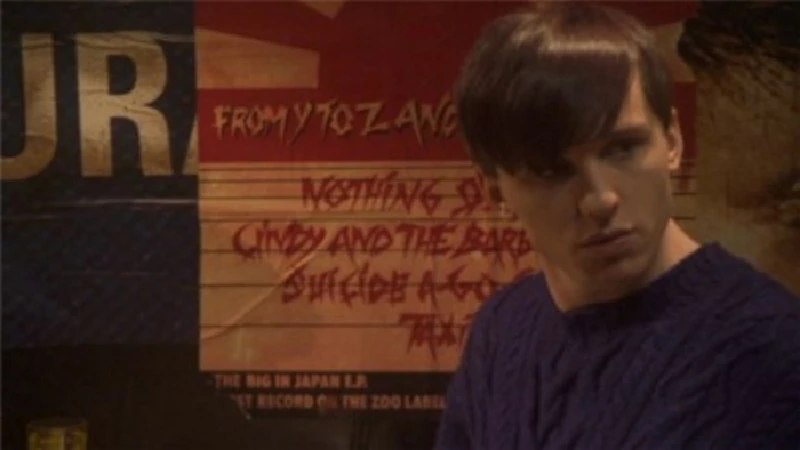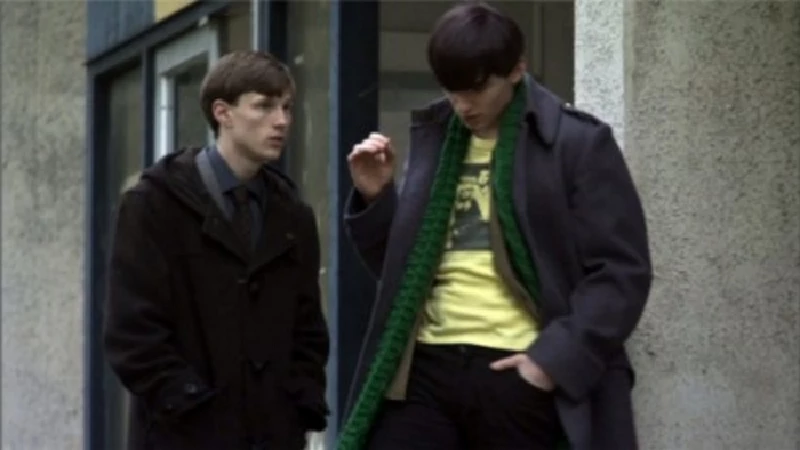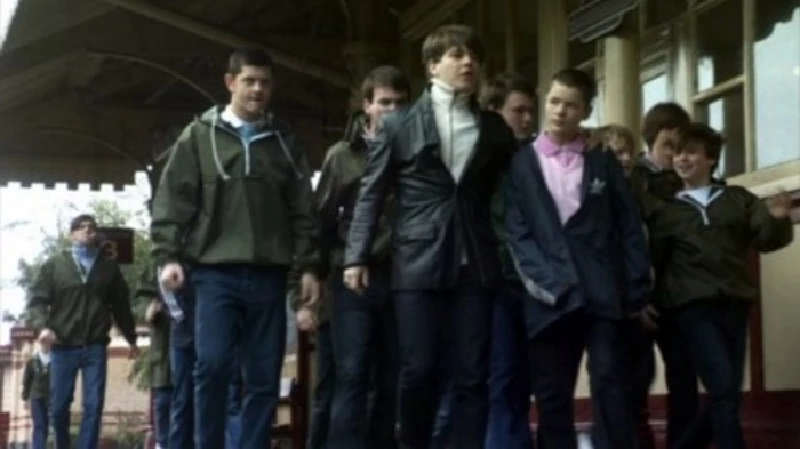Miscellaneous - Awaydays
by Anthony Middleton
published: 19 / 4 / 2009

intro
Anthony Middleton enjoys the post-punk soundtrack of 'Awaydays', a new film about late 70s Liverpool football hooligans and music fans, but finds it otherwise lacking grit and over stating its social commentary
At first glance, the introspection of post-punk is not be the obvious soundtrack to a story about a bunch of third rate Scouse hooligans rampaging through the Third Division in the late seventies. Joy Division, Magazine, the Cure and Echo and the Bunnymen would seem to be the antithesis of a gang of dead-eyed casuals, brandishing Stanley knives in an pointless urban guerrilla phoney war. But that is one of the main reasons the music works in 'Awaydays', the film of Kevin Sampson's novel set in the late seventies, when things seemed bad enough even before the arrival of Thatcherism. At times the whole thing can seem preposterous. Carty is a handsome young chap who can have any girl(and maybe any boy) who is wasting his life in a boring office job. So far, so much cliche. But he wants to be part of the Pack, a motley crew of hooligans who attach themselves to an unnamed (in the movie, but Tranmere Rovers in the book) Third Division club on Merseyside. He also likes the new music that has blossomed out of the death of punk. So does Elvis, another member of the Pack. Yes, he really is called Elvis. Carty's entry into the Pack is eased by Elvis, who seems to be very enamoured by the handsome young Carty and seems not to really get on with girls ! Hmmm. What can be going on here ? Not that this is a gay 'Romeo and Juliet' transferred to the world of rival football firms (though if anyone makes that, and they should, I want to be credited). It is more about the lack of meaning that both Carty and Elvis can find in their lives. Violence breaks the boredom, as does music. For most that is an either/or situation, but Carty and Elvis have it all. The film does its best at verisimilitude. But this was obviously low budget and you never really feel you are in the seventies, despite the odd Ford Cortina. The Pack are seen scrupulously developing the style that became casual, again the antithesis of post-punk, and this is portrayed accurately. But the music is the star and that must be disappointing for the filmmakers. A fight sequence that would be otherwise unconvincing is rendered operatic and menacing with the addition of Magazine's 'The Light Pours Out Of Me' and this applies throughout the film. Whether it is the Cure's '10.15 Saturday Night', Echo and the Bunnymen's 'Going Up' or Joy Division ('24 Hours' and 'Insight'), the music too often creates the mood and atmosphere that the filmmakers fall short of achieving. Though of course choosing the right soundtrack is part of making a good film. The makers had to do a lot of begging and convincing to permission to use all the songs they wanted. Kraftwerk said no, but generally, despite little in the way of payment, the likes of Ultravox, Caberet Voltaire and Steeleye Span (the use of 'Gaudette' is inspired in the vein of 'inappropriate soundtrack to violence' usage; see 'Stuck in the Middle' in 'Reservoir Dogs' and 'Atlantis' in 'Goodfellas') gave their permission and leant their much needed emotional weight to the film. Nicky Bell's Carty is both naive in the ways of the world and able to perform monstrous acts of violence. Liam Boyle as Elvis is the more complex character, embodying the changes that were about to be wrought on Britain with his descent into addiction and alienation while his talents and self-belief atrophy. There is something of the Lennon and McCartney about their relationship, with Elvis being the tortured mocking John to Carty's wide-eyed, guileless Paul. They both seem to have dead mums to boot. Stephen Godden is the sheep skin coated old fashioned hooligan General who is about to be made redundant and the Pack admirably do their job in reminding me of the bad days in the eighties when football grounds were the haunt of snivelling little shits who needed a knife to make up for something they were missing. I certainly didn't feel 'Awaydays' taught me anything new about that era, though it may be different for people who weren't there. It felt too much like a 'Play for Today', where dramatic insight comes a poor second to social commentary. Whether you would want to see it simply for music you probably already have is doubtful. It still doesn't manage to really get to grips with hooliganism any more that the farcical 'Green Street' or the soap opera 'Football Factory' did. Perhaps no one ever will because, let's face it, the whole notion of it is so silly.
Picture Gallery:-


most viewed articles
current edition
Carl Ewens - David Bowie 1964 to 1982 On Track: Every Album, Every SongBathers - Photoscapes 1
Colin Blunstone - Thalia Hall, Chicago, 16/7/2025
Visor Fest - Valencia, Spain, 26/9/2025...27/9/2025
Billie Eilish - O2 Arena, London, 10/7/2025
Bathers - Photoscapes 2
Sir Tim Rice - Interview
John McKay - Interview
Editorial - July 2025
Armory Show - Interview with Richard Jobson
previous editions
Heavenly - P.U.N.K. Girl EPTrudie Myerscough-Harris - Interview
Pixies - Ten Songs That Made Me Love...
Beautiful South - Ten Songs That Made Me Love...
Simon Heavisides - Destiny Stopped Screaming: The Life and Times of Adrian Borland
Oasis - Oasis, Earl's Court, London, 1995
Boomtown Rats - Ten Songs That Made Me Love....
Blues and Gospel Train - Manchester, 7th May 1964
Prolapse - Interview
Paul Nelson - Interview
most viewed reviews
current edition
Amy Macdonald - Is This What You've Been Waiting For?Sick Man of Europe - The Sick Man of Europe
Alice Cooper - The Revenge of Alice Cooper
Phew, Erika Kobayashi,, Dieter Moebius - Radium Girls
Lucy Spraggan - Other Sides of the Moon
Blueboy - 2
Cynthia Erivo - I Forgive You
Davey Woodward - Mumbo in the Jumbo
Lapsley - I'm a Hurricane, I'm a Woman In Love
Philip Jeays - Victoria
Pennyblackmusic Regular Contributors
Adrian Janes
Amanda J. Window
Andrew Twambley
Anthony Dhanendran
Benjamin Howarth
Cila Warncke
Daniel Cressey
Darren Aston
Dastardly
Dave Goodwin
Denzil Watson
Dominic B. Simpson
Eoghan Lyng
Fiona Hutchings
Harry Sherriff
Helen Tipping
Jamie Rowland
John Clarkson
Julie Cruickshank
Kimberly Bright
Lisa Torem
Maarten Schiethart